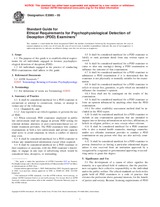We need your consent to use the individual data so that you can see information about your interests, among other things. Click "OK" to give your consent.
ASTM E2065-05
Standard Guide for Ethical Requirements for Psychophysiological Detection of Deception (PDD) Examiners
STANDARD published on 1.6.2005
The information about the standard:
Designation standards: ASTM E2065-05
Note: WITHDRAWN
Publication date standards: 1.6.2005
SKU: NS-44168
The number of pages: 2
Approximate weight : 6 g (0.01 lbs)
Country: American technical standard
Category: Technical standards ASTM
Annotation of standard text ASTM E2065-05 :
Keywords:
academic degree, counseling, ethics, fees, forensic psychophysiology, governmental approving entity, licensing, marriage counselor, mental health counselor, PDD examiners, quantitative analysis, regional accrediting entity, sex offender treatment provider, ICS Number Code 11.040.55 (Diagnostic equipment)
Additional information
| Significance and Use | ||
|
The development of a canon of ethics signifies the maturity in a specialized field of endeavor, that the practitioners recognize their collective responsibility to the individual and to the public welfare. The ethical standards set forth in this guide hold all PDD examiners to a code of practice that elevates the profession above personal interests, for the benefit of justice and society. Because licensing requirements of PDD examiners vary from state to state, the establishment of ethical practices is imperative. |
||
| 1. Scope | ||
|
1.1 The purpose of this guide is to establish ethical requirements for all individuals engaged in forensic psychophysiological detection of deception (PDD). 1.2 All individuals engaged in the practice of conducting PDD examinations shall adhere to this guide. |
||
| 2. Referenced Documents | ||
|



 Cookies
Cookies
